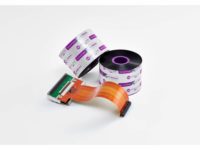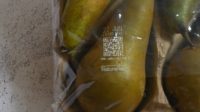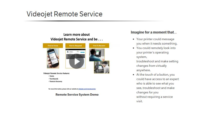Printing
Tips for Better Flexible Film Coding
Flexible film is today’s fastest-growing category of packaging, finding uses in a wide range of products. As a digital technology designed for flexible film, Thermal Transfer Overprinting offers many advantages over alternatives.

Premium Printhead, is the newer option available to improve high resin coding speed, without compromising quality. It’s only available in Markem-Imaje’s SmartDate® Xtreme Plus printhead. Photo courtesy of Markem-Imaje
Like any technology, it’s helpful to understand how it works before delving into optimization. The main elements of a TTO printer are the printhead, the inked ribbon, and the roller, or a flat platen for intermittent applications. The printhead consists of small heating elements within a ceramic unit. Elements are individually heated to form the characters.
When in operation, the printhead descends, squashing the ribbon and the packaging film against the roller, moving in the same direction as the packaging. The heating elements related to that code content heats up on the printhead, melting the ink on the ribbon, which allows it to be transferred onto the packaging film before the printhead returns to its start position within the TTO coder.
Offering a high resolution of around 300 dpi and approaching the quality of pre-printed packaging, TTO provides versatility in design, allowing barcodes, logos, and 2D codes to be printed. On average pack rates of up to 120-160 packs per minute (ppm) can be achieved, although more advanced units can reach up to 455 ppm, or 1,800 mm/s.
Why TTO?
Compared to mechanical approaches, like hot stamping and rotary coders, TTO provides greater uptime and less waste, while the inclusion of real-time data meets market demands for increased traceability. TTO not only prints better data, more easily, but also changing the data between runs is quicker.

TTO is also typically more easily integrated onto the packaging machine and provides a better print quality. It also offers a more flexible, and larger, print area. It can be ready within a minute, meaning there is virtually no equipment warm-up time. There is also no smell, mess, or drying time at the end of the process. Importantly, there is also zero risk of film perforation, unlike mechanical methods where broken stamps can pierce the packaging. In combination, this makes TTO a highly reliable option for flexible film.
Finally, with a relatively small initial capital outlay, as well as low maintenance and running costs, TTO offers an attractive return on investment.
Tips for Optimizing: Printhead and Ribbon Selection
TTO printheads can be divided into three categories: standard, robust, and premium. Categories are based on the sturdiness of the coding equipment and the required durability of the code.
To protect the heating elements, which are critical to character creation, they are enclosed in a ceramic overcoat. These ceramic coverings vary in their ability to withstand the repeated heating and cooling cycles and to resist abrasion. Both factors affect printhead life and coding speed.
To assess which printhead is right for your application consider these categories in the context of your printing needs:
Standard Printheads are robust enough for applications involving clean films in ordinary factory environments when printing on many food and beverage products.
Robust Printheads, with stronger ceramic coatings, support printing in more challenging environments such as coding potato bags on a farm, where dirt and stones are at high risk of scratching the ceramic surface. Using a standard printhead in that situation would result in more problematic prints, and the printhead would have to be replaced frequently.
Premium Printhead, this newer option has been introduced to improve high resin coding speed, without compromising quality. Such technology is currently only available in Markem-Imaje’s SmartDate® Xtreme Plus printhead.
Considerations for TTO Coding
Using printheads correctly will give a higher quality print for longer and extend the life of the printhead, reducing costs and downtime.
Uptime and sustainability efforts can be improved by using long thermal transfer ribbon rolls. Providing 80% more prints per roll means less changing is required while reducing roll waste and minimizing energy consumption.
It’s wise to question using third-party ribbons. While initially, it may appear cheaper, the third-party ribbon provider could void a manufacturer’s warranty, and usage is likely to cause premature printhead wear. All of this leads to long-term extra costs.
Regular printhead cleaning is also vital. On busy production lines printhead cleaning often doesn’t take place as frequently as needed. Insufficient cleaning results in an accumulation of dust, dirt and debris on the printhead. Ultimately, that leads to poor and possibly unreadable codes. Cleaning the printhead with every ribbon change prevents such problems and is a good tactic for limiting the downtime impact. Finally, choose a supplier who offers a printhead warranty to further minimize maintenance costs.
TTO for Increased Uptime, Quality and Traceability
The most challenging of environments, premium printheads can be applied in challenging environments while maintaining high quality and speed. TTO is a cost-effective and reliable solution for flexible film coding. By selecting the correct printhead for the application and following basic best practices, TTO contributes to an optimized production line, delivering reliable, high-quality codes.
Looking for a reprint of this article?
From high-res PDFs to custom plaques, order your copy today!






